Van Rysel RCR Pro review - is it a superbike killer?
The most hyped bike of 2024 ridden and reviewed. Does the Van Rysel RCR Pro live up to expectations?
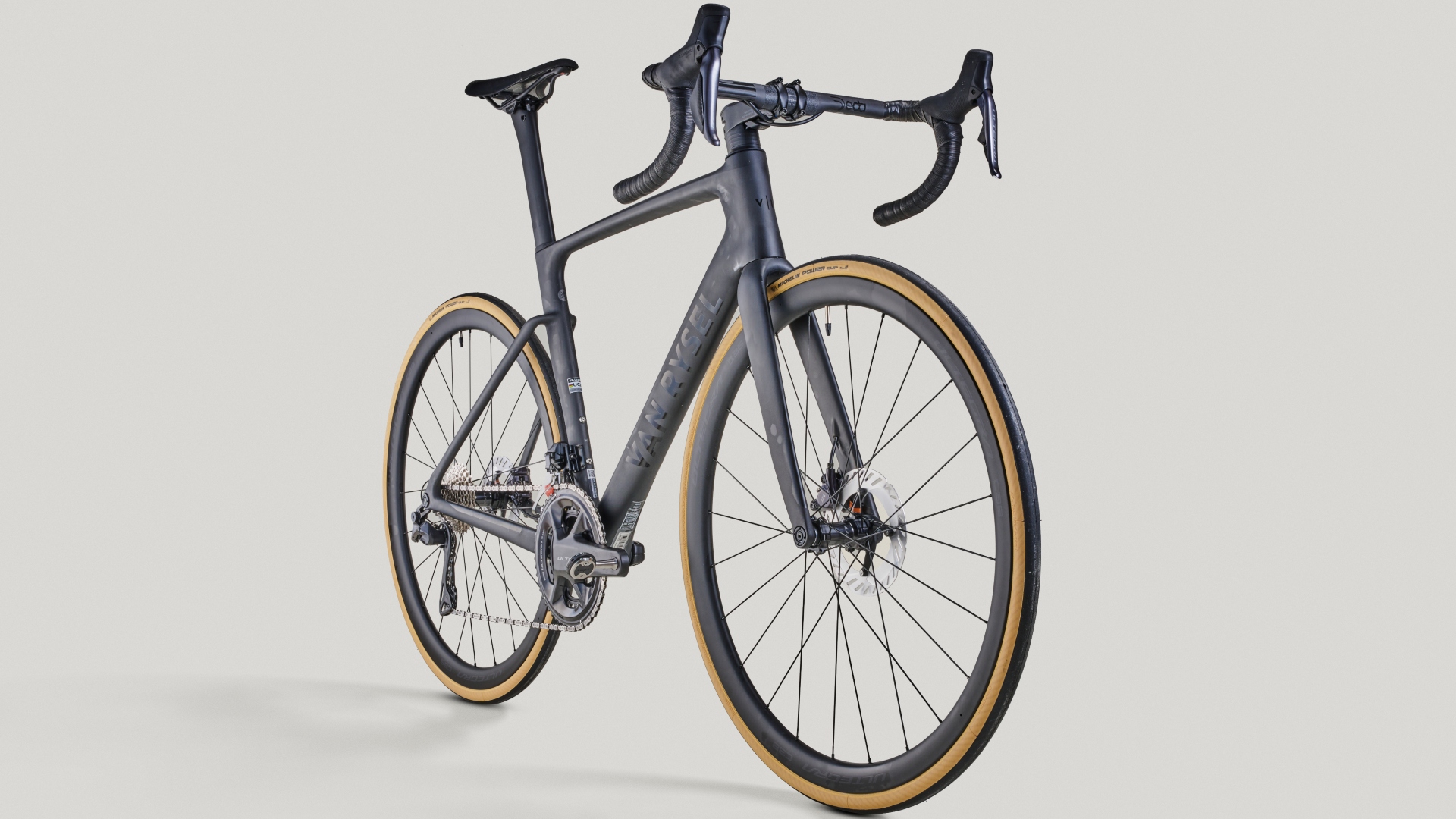
The Van Rysel RCR Pro is a safe, solid choice. It handles well, albeit a little slow for my personal taste, and is fairly light at 7.28 kg. But where the RCR Pro shines on the spec sheet, it falls a little short on the road. A comfortable ride comes at the expense of a slightly less than exciting experience out on the lanes.
-
+
Lightweight for the price
-
+
A great looking bike
-
-
Slightly numb ride feel
-
-
Not necessarily the best-value bike out there
You can trust Cycling Weekly.

The Van Rysel RCR Pro is, without a doubt, one of the most talked about bikes in 2024, and for good reason. The Decathlon subsidiary brand has only been around in its current form since 2019 and has historically been known for value-driven products, rather than always aiming for halo bikes. In the last twelve months, however, all this has changed.
Last year, Van Rysel unveiled the RCR Pro, promising top-end race bike performance, at a far more modest price than some of its competition. This was followed by an announcement of a €26 million budget injection to Decathlon AG2R La Mondiale, who have been riding the bikes all season long, and with great success.
But WorldTour victories aside - has Van Rysel really made a superbike killer? Allow me to explain.
Van Rysel RCR Pro: Construction
If you were to catch a glimpse of the RCR Pro as it rolled past you at the cafe, you’d be forgiven for assuming you had just seen yet another Specialized Tarmac SL7. The RCR Pro does share some signature design elements such as a cut-out on the seat tube, dropped seat stays, a sloping top tube, and a slightly deeper head tube. This is far from a complaint, however - the Van Rysel RCR Pro is a splendid-looking machine, and certainly looks at home in the WorldTour stable.
The frameset is claimed to weigh just 790 grams for a size medium, which goes toe to toe with the competition. In fact, it comes just a smidgen away from the likes of the much more costly Factor O2 VAM, and surpasses the Cannondale Supersix Evo Hi-mod’s 810g frame weight. All this was achieved through the usual toil of computational iterative design, to work out where best to place the ‘super Hi Mod Carbon’ throughout the frameset.
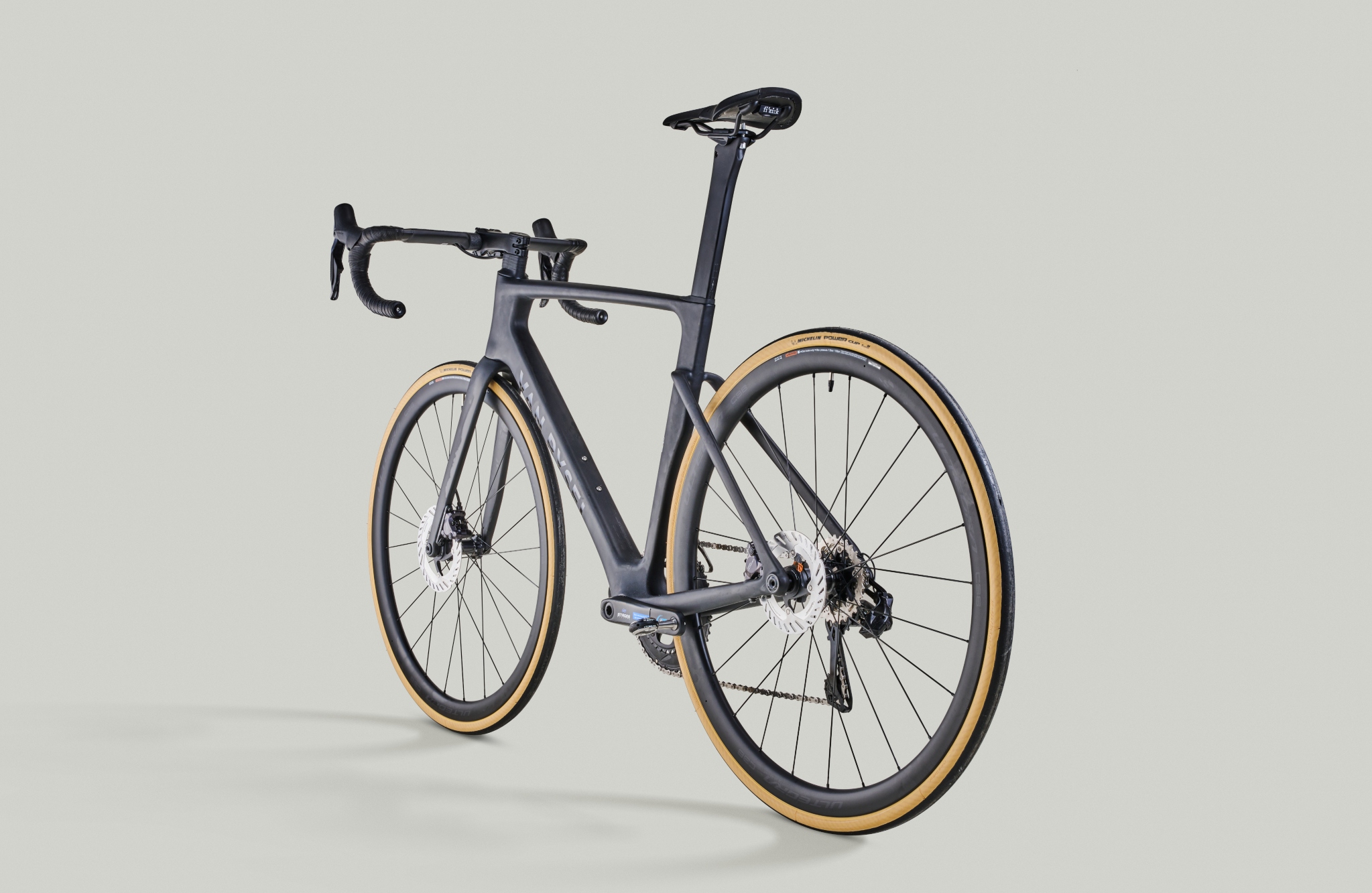
In appearance at least, the Van Rysel RCR Pro has Specialized Tarmac vibes
The latest race content, interviews, features, reviews and expert buying guides, direct to your inbox!
With the RCR Pro being a high-end, modern-day race bike, its aerodynamics have been meticulously considered. The frameset was first subject to computational fluid dynamics testing before different iterations of the bike were tested in the wind tunnel so that Decathlon engineers could create the fastest Van Rysel frame shape possible.
The RCR Pro features an aggressive stack-to-reach ratio of 1.40, which is coupled with 410mm chainstays. The wheelbase is a little bit longer than some of my favourite performing race bikes, which as I’ll come onto, plays a part in the bike’s stable handling.
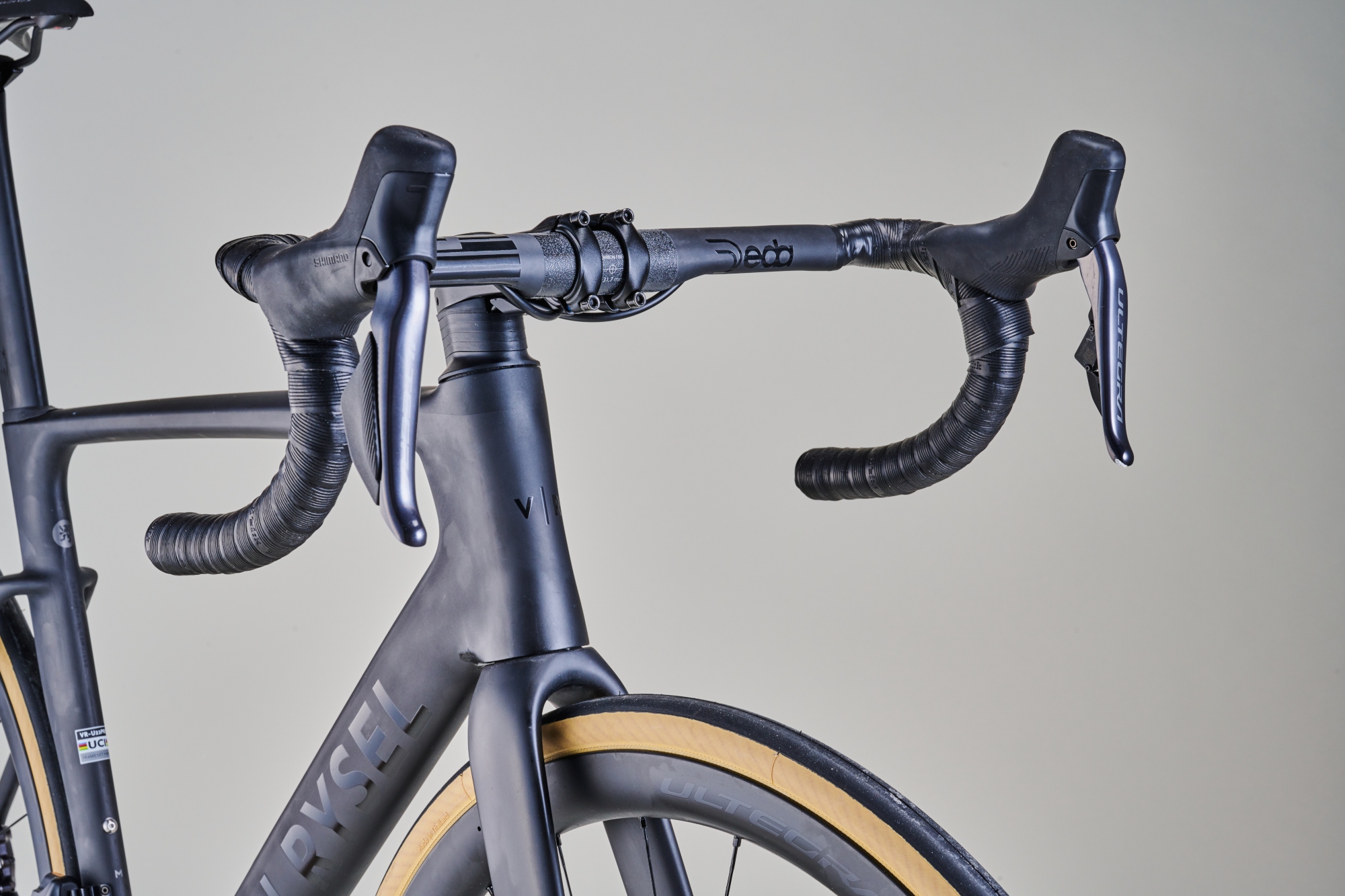
Two-piece cockpit features Deda’s Superzero handlebar
As far as spec is concerned, my RCR Pro on test is a slightly mixed bag. Groupset duties are handled by Shimano’s Ultegra R8170 Di2, wheels included, which all performed expectedly reliably. Finishing kit on the other hand was more varied. The handlebars are a two-piece setup, with Deda’s Superzero handlebar. Coming in at 42cm centre to centre, they did feel a little wide, and I found the drop to be rather shallow too, which hindered me from getting properly comfortable. For reference, Canyon’s pace bar system can be adjusted down to 35cm, and similarly, Pinarello offers cockpits down to a 35cm wide handlebar with the new Dogma. The upside though, is that thanks to the two-piece design, changing out the handlebar isn’t too tricky.
Van Rysel RCR Pro: the ride
Lay my handlebar taste to the side, however, and it’s a pretty formidable bike on paper. The issue, for me at least, is this didn’t quite translate to greatness out on the tarmac.
As is the case with all my road bike tests, I started off with a local testing loop which I’m beyond familiar with. This 25km loop features some steep climbs, a fast descent, and some rough and smooth road surfaces too, all of which allow me to get a good feel for a bike's handling in a controlled environment. The bike immediately felt stable, but I couldn’t quite get the bike to feel alive underneath me like I have with other bikes on test of recent.
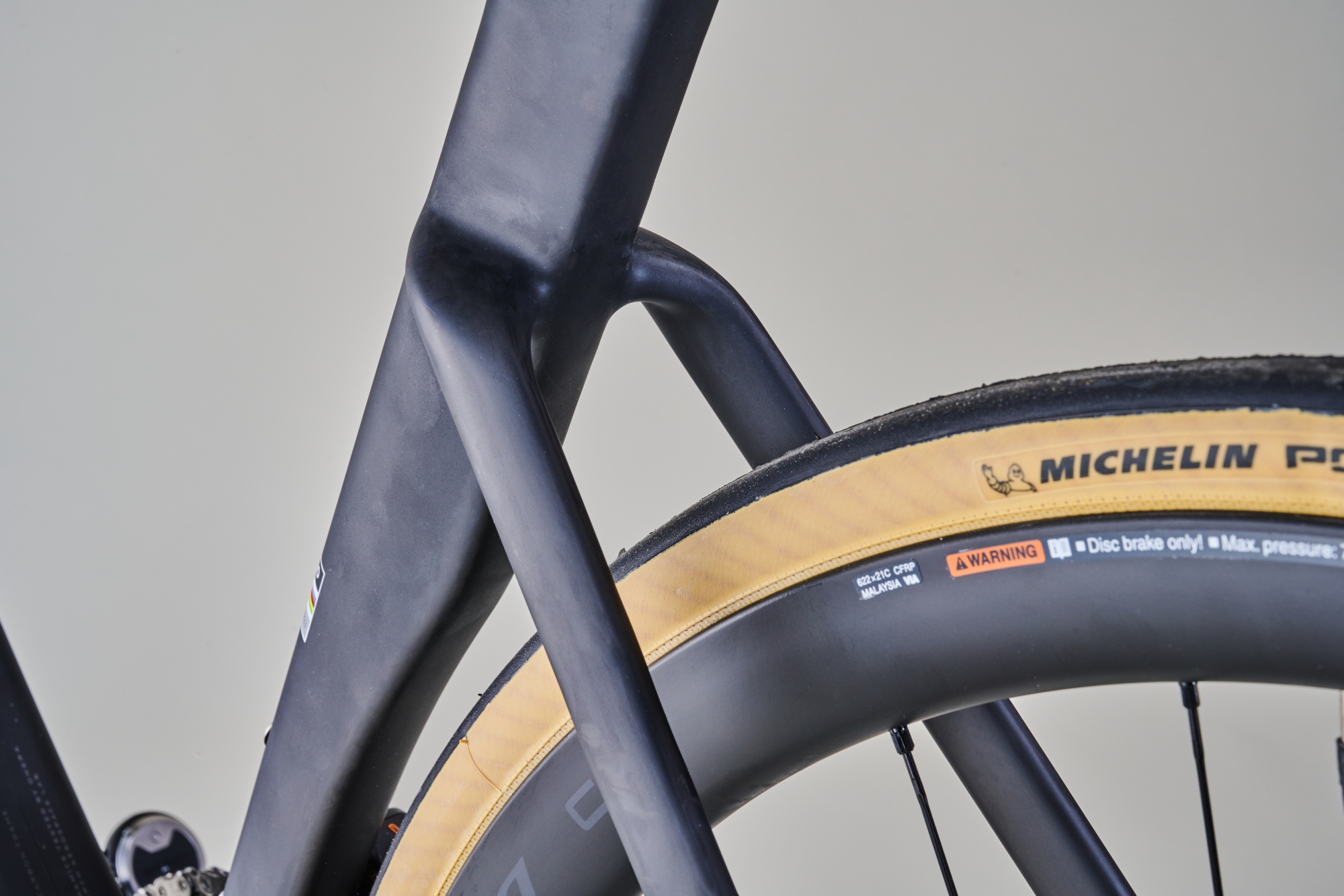
Wheels are Shimano’s Ultegra
Still, not one to hold a grudge against a bike after a mediocre first impression, I continued testing with some longer rides out into the Cotswolds, where I put the bike to the test on some tougher climbs. Once again though, it was mixed feelings on the road. The Van Rysel RCR Pro is certainly a very comfortable bike, doing a great job of evening out the plentiful bumps on my local Oxfordshire roads, however, this comfort does seem to come at the detriment of responsiveness. Once or twice I did have a seat post slip too, albeit on a particularly harsh road surface.
Particularly while climbing out of the saddle, or sprinting, I found the RCR Pro to lack the responsiveness that the best race bikes do so well to capture. By all means, the RCR Pro is a fast bike, numerous WorldTour victories prove that, but the slightly dull ride feel means it’s not such a joy to ride as other bikes out there.
The bike performs very well on the descents. The slightly longer wheelbase, in conjunction with the aggressive head angle, makes for a stable ride that still changes direction pretty well. The RCR Pro was a bike I found myself being able to push pretty hard right from the get-go.
Value and Conclusion
Has Van Rysel really created a super bike killer? After all, the point of this bike is to provide WorldTour quality at a cheaper price.
Our test bike is priced at £5,500, and comes with Ultegra Di2, carbon wheels, and two-piece finishing kit, which is great value, but not unheard of. For example, the new Canyon Aeroad CF SLX 8 comes with the same groupset, DT Swiss wheels, and an integrated aero cockpit for just £500 more at £5,999, and having ridden both bikes, I’d say the Canyon is better value for money. The caveat here is that in the case of the Canyon, you are getting a second tier frameset, however, with little to choose between framesets, I would still argue the CF SLX can still be compared to the RCR Pro.
So while yes, it does slightly undercut the competition at this price point, I do not necessarily think that means it is the best value bike on the market. I think Van Rysel has absolutely secured its foothold in the market with the RCR Pro, and this race bike has certainly elevated the brand too, but I still think it is still one or two iterations from upsetting the big players.
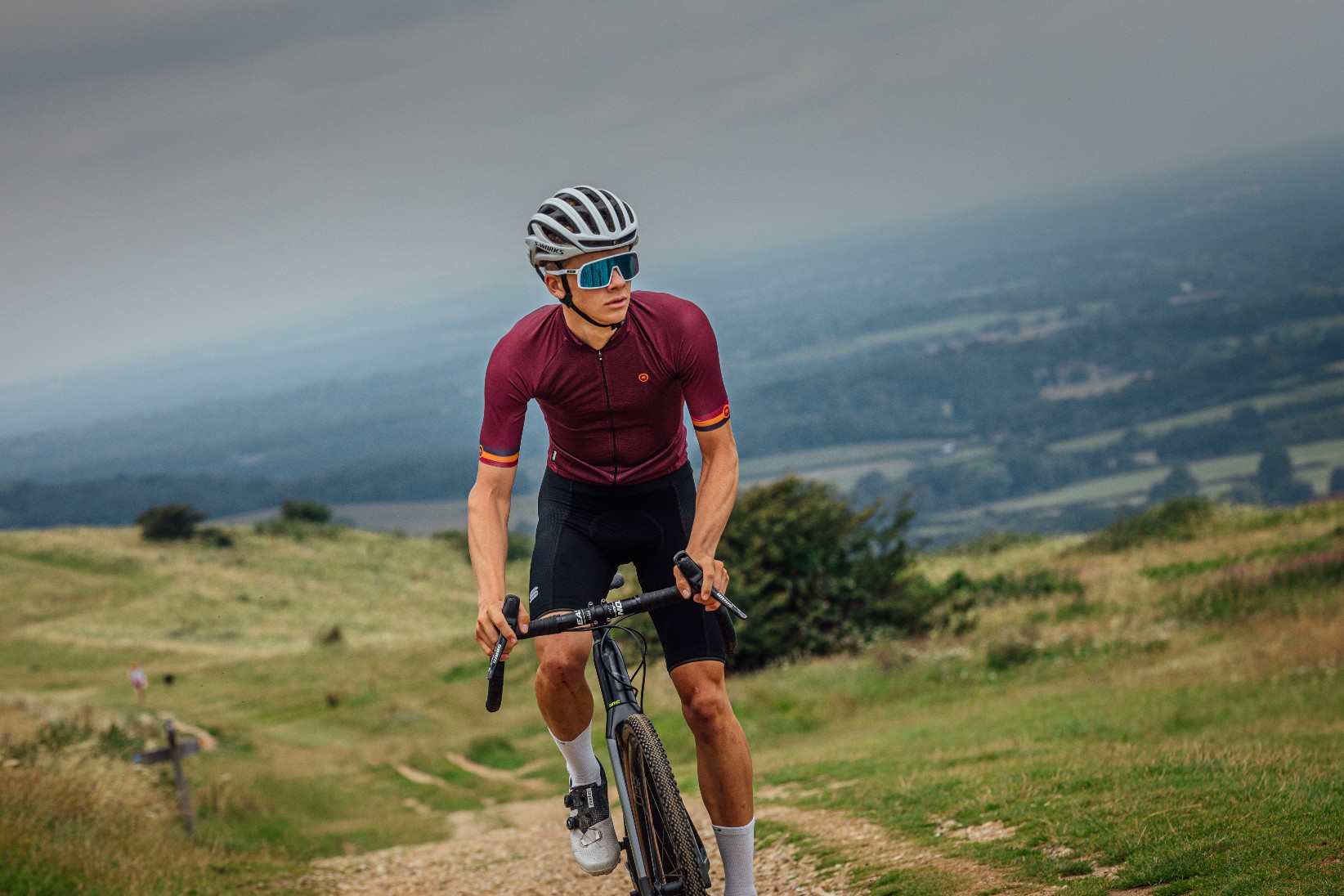
Joe is Cycling Weekly's former tech writer. He's always had a love for bikes, since first riding a two wheeled steed before the age of four. Years down the line, Joe began racing at 16, and enjoyed great experiences internationally, racing in Italy, Spain and Belgium to name a few locations. Always interested in tech, Joe even piloted his Frankenstein hill climb bike to a Junior National Title in 2018. After taking a step back from elite level racing in April 2022, Joe joined our team as a freelancer, before becoming Tech Writer in May 2023.